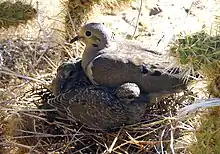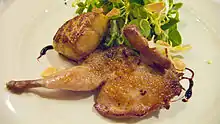squab
English

A nesting dove with squabs

Squab (young pigeon) leg and breast
Etymology
Unknown, unattested before 17th c.. Possibly descended from Swedish dialect skvabb (“fatty, flabby”).
Pronunciation
- (Received Pronunciation) IPA(key): /ˈskwɒb/
- (General American) IPA(key): /ˈskwɑb/
Audio (AU) (file) - Rhymes: -ɒb
Noun
squab (countable and uncountable, plural squabs)
- (countable, sometimes attributive) A baby pigeon, dove, or chicken.
- (uncountable) The meat of such a baby bird used as food.
- 2022, Jennifer Egan, The Candy House, Corsair, page 207:
- Squab may be consumed by ripping the bird apart with your hands and sucking the meat from the bones.
- (countable) A baby rook.
- (countable) A thick cushion, especially a flat one covering the seat of a chair or sofa.
- a. 1744, Alexander Pope (imitating Earl of Dorset), Artemisia, 1795, Robert Anderson (editor), A Complete Edition of the Poets of Great Britain, page 86,
- On her large ſquab you find her ſpread, / Like a fat corpſe upon a bed, / That lies and ſtinks in ſtate.
- 1846 October 1 – 1848 April 1, Charles Dickens, “Retribution”, in Dombey and Son, London: Bradbury and Evans, […], published 1848, →OCLC, page 591:
- [H]erds of shabby vampires, Jew and Christian, over-run the house, [...] punching the squabs of chairs and sofas with their dirty fists, touzling the feather-beds, opening and shutting all the drawers, balancing the silver spoons and forks, looking into the very threads of the drapery and linen, and disparaging everything.
- a. 1744, Alexander Pope (imitating Earl of Dorset), Artemisia, 1795, Robert Anderson (editor), A Complete Edition of the Poets of Great Britain, page 86,
- (countable) A person of a short, fat figure.
- a. 1800, William Cowper, “The Progress of Error”, in Poems of William Cowper, Esq, published 1824, page 28:
- Gorgonius sits abdominous and wan, / Like a fat squab upon a Chinese fan:
Synonyms
Derived terms
Translations
baby pigeon or dove
|
meat of a young pigeon or dove
|
baby rook
|
Verb
squab (third-person singular simple present squabs, present participle squabbing, simple past and past participle squabbed)
Adjective
squab (comparative more squab, superlative most squab)
- Fat; thick; plump; bulky.
- 1712, Thomas Betterton, The Miller of Trompington:
- Nor the squab daughter nor the wife were nice.
- 1789, Erasmus Darwin, The Loves of the Plants, J. Johnson, page 93:
- So on his Nɪɢʜᴛᴍᴀʀᴇ through the evening fog / Flits the squab fiend o'er fen, and lake, and bog […] .
- Unfledged; unfeathered.
- 1836, Richard King, Narrative of a Journey to the Shores of the Arctic Ocean:
- broken limbs of trees, eggs, and young squab pigeons precipitated from above
- Clumsy.
- Curt; abrupt.
- Shy; coy.
Adverb
squab (not comparable)
- (slang) With a heavy fall; plump.
- 1692, Roger L’Estrange, “ (please specify the fable number.) (please specify the name of the fable.)”, in Fables, of Æsop and Other Eminent Mythologists: […], London: […] R[ichard] Sare, […], →OCLC:
- The eagle took the tortoise up into the air, and dropped him down, squab, upon a rock.
Part or all of this entry has been imported from the 1913 edition of Webster’s Dictionary, which is now free of copyright and hence in the public domain. The imported definitions may be significantly out of date, and any more recent senses may be completely missing.
(See the entry for “squab”, in Webster’s Revised Unabridged Dictionary, Springfield, Mass.: G. & C. Merriam, 1913, →OCLC.)
Anagrams
This article is issued from Wiktionary. The text is licensed under Creative Commons - Attribution - Sharealike. Additional terms may apply for the media files.